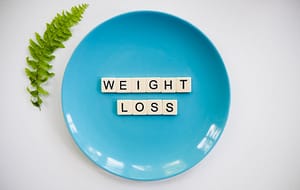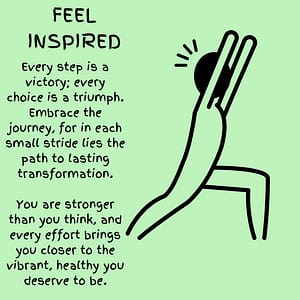As a woman going through menopause, I understand how challenging weight management can be during this transitional phase. The hormonal changes we experience can make traditional weight-loss approaches less effective, but I’m here to help you set achievable menopausal short-term weight-loss goals that work with your body’s changes.
Let’s address the reality: while only 9% of Americans complete their New Year’s resolutions, with 43% quitting by January’s end (Fisher College of Business), we can beat these odds by setting menopause-friendly goals that account for our unique needs.
For us menopausal women, successful weight management requires understanding how hormonal fluctuations affect our bodies. Our smart goals need to focus on:
- Managing estrogen-related weight gain, especially around the midsection
- Adapting exercise routines to support bone health and muscle mass
- Implementing stress-reduction techniques to balance cortisol levels
- Creating sustainable eating patterns that support hormonal balance
Remember, we’re not just aiming for weight loss – we’re working toward optimal health during menopause. Setting SMART goals (Specific, Measurable, Achievable, Relevant, Time-bound) becomes even more crucial during this life stage.
I’ll guide you through creating personalized targets that consider your menopausal symptoms and lifestyle needs. Together, we’ll develop strategies that not only help with weight management but also support your overall well-being during this important transition.
By breaking down our larger health objectives into manageable steps and celebrating small victories along the way, we can maintain motivation and achieve lasting results, even as our bodies change.
Smart Short-Term Weight-Loss Goals During Menopause
1. Making Myself Accountable
- As a woman going through menopause, I know accountability is crucial for my weight loss success
- I need to be honest with myself about the hormonal changes affecting my body
- I must identify what I’m willing to change in my lifestyle to support my weight loss during this transition
Practical Steps I Can Take:
My Menopause Journal:
- I’ll track my hot flashes, mood changes, and eating patterns daily
- I’ll note which exercises work best for my changing energy levels
- I can use either a paper journal or a weight-loss app designed for menopausal women
Weekly Check-Ins:
- Every Sunday, I’ll review my progress
- I’ll measure my waist circumference, as menopause often causes middle-body weight gain
- I’ll adjust my plan based on what’s working for my body
2. Staying Motivated During Hormonal Changes
- I understand my body is changing, and that’s okay
- I’ll focus on health benefits beyond just weight loss
- I’ll celebrate small victories, like choosing a healthy snack during a craving
My Motivation Tools:
My Vision Board:
- I’ll include images of active, healthy women in their menopausal years
- I’ll add photos of bone-strengthening activities I want to try
- I’ll write affirmations about embracing this new phase of life
3. Tracking My Progress
- I’ll measure what matters during menopause
- I’ll track my sleep quality alongside my weight
- I’ll monitor my strength gains, not just the scale
My Measurement System:
- Weekly weigh-ins at the same time each day
- Monthly body measurements, focusing on waist and hips
- Progress photos every two weeks
- Strength tracking: how many push-ups, squats, or weight lifted
Here’s my personalized adaptation focusing on menopausal women’s weight loss goals in 2025:
4. Building Your Confidence During Menopause
I’ve seen how achieving short-term weight loss goals during menopause can significantly boost your confidence. Let me share what I’ve learned:
* When you’re dealing with menopause symptoms, even small victories deserve celebration
* I recommend tracking your progress, as seeing improvements in hot flashes and energy levels alongside weight loss can be incredibly motivating
* Your growing confidence will help you tackle both menopause and weight management challenges
Strategic Exercise Approaches I Recommend:
* I suggest starting with low-impact exercises that are gentle on your joints
* Begin with 15-minute walks when energy levels are highest (typically early morning before hot flashes peak)
* As your strength builds, I recommend gradually increasing to 30-minute sessions
Celebrating Your Achievements:
* I encourage you to acknowledge every win – whether it’s choosing a healthy snack during a hot flash or completing a workout despite fatigue
* Keep a journal to track both weight loss and menopause symptom improvements
* Reward yourself with non-food treats when you reach milestones
5. Creating Sustainable Success During Menopause
I emphasize sustainable practices that work with, not against, your changing body:
> Focus on hormone-balancing foods
> Develop stress management techniques specifically for menopausal symptoms
> Create flexible routines that adapt to your energy levels
Mindful Eating Strategies I Recommend:
* Pay attention to new food triggers that may develop during menopause
* I suggest eating smaller, more frequent meals to manage energy levels
* Choose foods rich in calcium and protein to support bone health
Physical Activity Tips:
- I recommend low-impact exercises like swimming or yoga that won’t exacerbate joint pain
- Schedule workouts during your high-energy times
- Include strength training to maintain muscle mass
6. Maintaining Flexibility in Your Approach
I understand that menopause symptoms can vary daily, so I suggest:
* Having backup plans for high-symptom days
* Adjusting exercise intensity based on your energy levels
* Keeping healthy, quick meal options available for challenging days.
Remember, this journey is unique to you. I encourage you to be patient and adapt these strategies to your specific needs during menopause.
Understanding Your Menopausal Weight Loss Journey
As someone who works with women going through menopause, I understand that weight loss during this transition requires a unique approach. Let’s explore strategies that specifically address our changing bodies and hormones in 2025.
Adapting to Hormonal Changes:
- I recommend regularly reassessing your goals as your body responds to hormonal fluctuations. What worked last month might need adjustment today.
- With the latest hormone-tracking apps and wearable technology of 2025, we can better understand our body’s patterns and adjust accordingly.
Managing Menopausal Setbacks:
- Hot flashes disrupting your sleep? I’ve found that cooling bedding technology and temperature-regulating sleepwear can help maintain your exercise routine energy.
- When mood swings affect your eating patterns, try the new mindful eating apps designed specifically for menopausal women.
Menopause-Friendly Meal Planning:
- Focus on foods that support hormone balance and metabolism. I recommend incorporating calcium-rich ingredients and foods high in plant-based proteins.
- Try the latest meal-planning apps that specifically cater to menopausal nutrition needs.
Professional Support:
- Consider virtual consultations with menopause-specialized nutritionists and fitness trainers.
- Explore the new generation of joint-friendly exercises designed for women over 50.
Preventing Overwhelm During Menopause:
- Break down goals into hormone-cycle-friendly chunks. For example, plan higher-intensity workouts when your energy levels typically peak.
- Use menopause-tracking apps to identify patterns and plan activities accordingly.
- Practice stress-reduction techniques that specifically target menopausal symptoms.
Building Your Support Network:
- Join online communities of women sharing similar experiences.
- Connect with virtual support groups using 2025’s enhanced telehealth platforms.
- Share your journey with family and friends who can provide emotional support.
Remember, menopause is a natural transition, and with today’s advanced understanding and resources, we can navigate weight loss goals while honoring our body’s changes.
How Do Celebrities Stay Thin During Menopause
As someone who works closely with women experiencing menopause, I understand that weight management during this time requires a thoughtful, personalized approach. I’ve observed that celebrities who maintain their figures during menopause typically follow a comprehensive strategy. While they may have access to premium resources, their core approaches can be adapted for everyone. Professional fitness trainers and nutritionists create customized programs that focus on hormone-friendly exercises and nutrition plans, as supported by research from Chiswick Physiotherapy’s menopause strength training studies.
From my experience coaching menopausal women, I’ve found that strength training is particularly effective. It helps combat the natural muscle loss that occurs during menopause and boosts metabolism. I recommend starting with bodyweight exercises and gradually progressing to resistance training. This approach aligns with evidence-based weight management strategies documented by BMI Doctors, which emphasize sustainable, long-term habits over quick fixes.
One aspect I’ve seen make a significant difference is stress management and sleep optimization. I encourage my clients to develop a consistent sleep routine and practice stress-reduction techniques like meditation or gentle yoga. These practices help regulate cortisol levels, which directly impact weight management during menopause. For tracking progress and maintaining motivation, I use specialized goal-setting tools that help break down larger objectives into manageable daily tasks. While everyone’s journey is different, focusing on these fundamental areas can help create sustainable results, similar to what we observe in celebrities who maintain healthy weights during menopause.
Transform Your Body: Proven Weight Loss Strategies for Menopause
Next-Gen Workouts: Your Ultimate 7-Day Exercise Guide for 2025




Pingback: How to Create a Beginner-Friendly Exercise Routine During Menopause
Pingback: Transform Your Body: Proven Weight Loss Strategies for Menopause
Pingback: How to Create a Beginner-Friendly Exercise Routine During Menopause
Comments are closed.